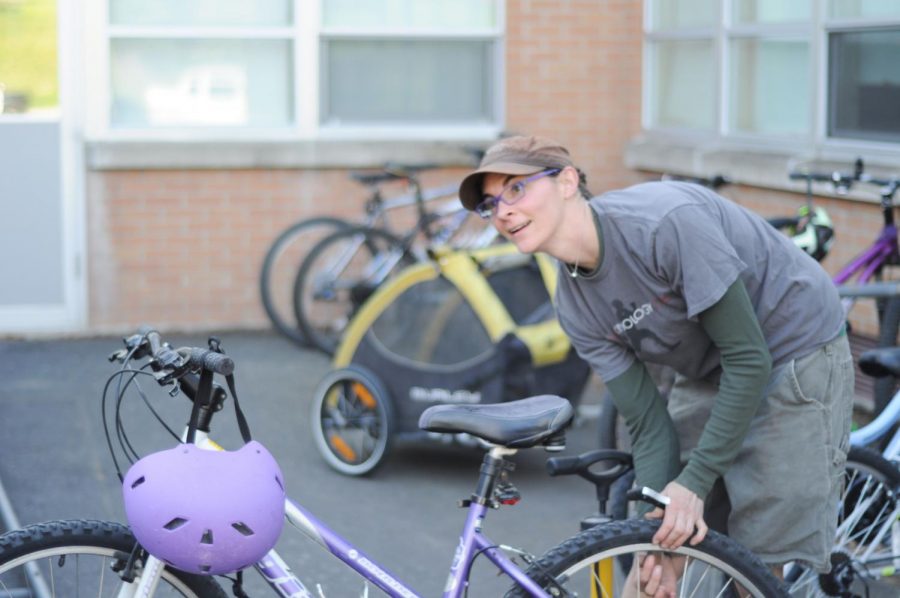Bicycle safety program kicks into gear
Students rode their bikes to school on Wednesday during National Bike Month
DANIEL DOUCET | THE DAILY EVERGREEN
Volunteer bike mechanic Jen Jackson performs inspections on bikes at Moscow Middle School on National Bike to School Day on Wednesday.
May 8, 2019
Students throughout Moscow spent time Wednesday morning reviewing their ABC’s. Their air, brakes and chain, that is.
As part of National Bike to School Day, volunteer bicycle mechanics from a local shop arrived at Moscow Middle School around the time many students were riding in on their bikes.
Jen Jackson, founder and executive director of Palouse Bicycle Collective, said their main goal is to provide education and tools to the community.
“Pretty much anything bike-related, we like to do,” she said.
As students began arriving on their bicycles by the dozens, Jackson and other volunteers started going through inspections.
“For today, we aren’t doing full tuneups,” she said. “We’re doing what we call ABC quick checks.”
Jackson and others moved down the long line of bicycles parked in the bike racks on the side of the school, checking the tire air pressure, brake function and chain. She said each safety check takes about 10 minutes.
After one student rode in fast and dragged his feet on pavement to stop, volunteer Tami Goetz walked over and asked to check out his brakes. She encouraged him to come to the shop after school to get his bike fixed.
Goetz said the nonprofit bike shop welcomes everyone, and provides full service for bikes as well as selling used ones.
“We just try to make sure people have affordable access to bicycles,” Goetz said. “And we champion education.”
The mechanics were at the school as part of a partnership with Safe Routes to School, a grant program through the University of Idaho Department of Movement Sciences. Grace Goc Karp, one of the program’s co-directors, said they have provided new bike racks, training for crossing guards, sidewalks and trails.
“We do a lot of education and encouragement for kids walking and biking to school,” she said.
As students rode in and parked their bikes, Goc Karp asked each one that arrived without a helmet if they would like a free one.
“That looks really cool,” she said to one student as she helped adjust the chinstrap. “Promise me you’ll wear it because it will keep your head nice and safe.”
Safe Routes to School coordinator Erin Bacon said Bike to School Day is one of her favorite days of the year. In addition to the middle school, bike events took place at seven other Moscow schools.
“If you’re one of my kids, every day is bike to school day,” she said, “but [on Bike to School Day] you get a sticker.”
Bacon said the program specializes in tactical urbanism, which includes redesigning trails, sidewalks, crosswalks, parking lots and streets to be more accessible to bicyclists and pedestrians.
Goc Karp said the program has partnered with the city to make these improvements.
“We’ve worked with the city in getting sidewalks,” she said.
Bacon also emphasized that education plays a large part in the program.
“You can have all the safe crossings in the world,” she said, “but if kids don’t know how to use them then they can’t benefit from it.”
Goc Karp said they receive federal grant money through the Idaho Department of Transportation.
“We’ve been able to get grants for 12 years,” she said.
The program, which has helped foster a coalition between the city, parents, schools, police and others, has made a lot of progress since they began, Goc Karp said.
“Originally I think parents weren’t quite sure it was safe for students to get to school,” she said. “Now we find they do feel better.”
Program members have judged their success based on annual forums, Goc Karp said, including one where they had parents put stickers on a map of a park to indicate where they thought safety improvements could be made. She said they also get feedback from conversations with principals, surveys and by checking on the growing number of bikes at each school.
“Everyone is trying to make it safer,” Goc Karp said.









